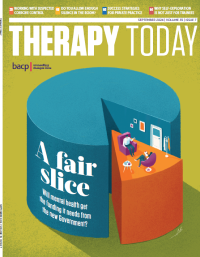It’s ironic really that I ended up in a public facing industry as a TV presenter, as the way I learned to cope from a very young age was to stay quiet and make myself as invisible as possible. It’s how I survived domestic abuse growing up, and then sexual abuse as a teenager by my running coach.
Standing on stage, speaking into a microphone to an audience of millions and smiling down a camera lens felt more comfortable for me than telling someone one-on-one what I was feeling. Those who have survived trauma are the most resilient people you’ll ever meet, but that’s not always helpful. I’d become so resilient that I struggled to be vulnerable – not just to others but also to myself.
One of my coping mechanisms was to keep on moving, work harder and push harder. In 2016 I cycled 3,000 miles from London to Rio de Janeiro for charity, and 24 hours after finishing the last mile I was in hospital fighting for my life. Malaria and three other hard-to-pronounce diseases left me in a coma and on life support with multiple organ failure. After a long period in hospital and an even longer road to recovery, I was diagnosed with posttraumatic stress disorder. I was having flashbacks, nightmares, anxiety attacks and major lows, and felt like I’d completely lost who I was.
Five months later I sat face-to-face with my therapist, Rachel, a clinical psychologist, but despite wanting help I couldn’t open up. I spent the entire first session telling her how well I was doing and the following sessions doing the same. I wasn’t doing it on purpose, I just couldn’t seem to help it. Every time I wanted to cry and scream it was like a robot took over and buried my feelings. Rachel finally said to me, ‘If you are fine, then why are you here?’ It totally threw me and, for the first time, I got upset and told Rachel I wasn’t OK.
I’d been diagnosed with depression at 17 years old and put on antidepressants with no mention of talking therapy or questions about why I was feeling the way I was. When I later decided to try counselling I couldn’t seem to emotionally connect to it. I told an edited version of my story as if it had happened to someone else. I left counselling telling myself I’d tried but it didn’t work.
One of the things I wish I’d known back then is that therapy isn’t a quick fix. It can take time to understand what we are feeling and why, process the things we’ve experienced, see our patterns of behaviour and reframe our thoughts. For me it’s also been about letting the feelings out that I kept at bay for so long, allowing myself to openly feel the upset inside and learning compassion for myself.
I saw Rachel for two years and for a year after that I was part of a weekly therapy group that she ran. It focused on schema therapy and was structured like a progressive course that you had to attend every week. Sitting in that group was extremely uncomfortable but it’s exactly what I needed and the best thing I could have done. I was always on the run, but being on the run from your own feelings is near impossible. The group showed me for the first time that I wasn’t alone and I wasn’t a failure because of the way I felt.
When I first walked into Rachel’s therapy room I could never have imagined I would go on the journey I did. At times I felt worse during therapy, I cried more than I’d ever cried in my life, and it brought up things I had hidden even from myself. It was exhausting but it was even more exhausting carrying on living the way I was, constantly at war in my own head. I can now treat myself with the love and kindness I always deserved.

